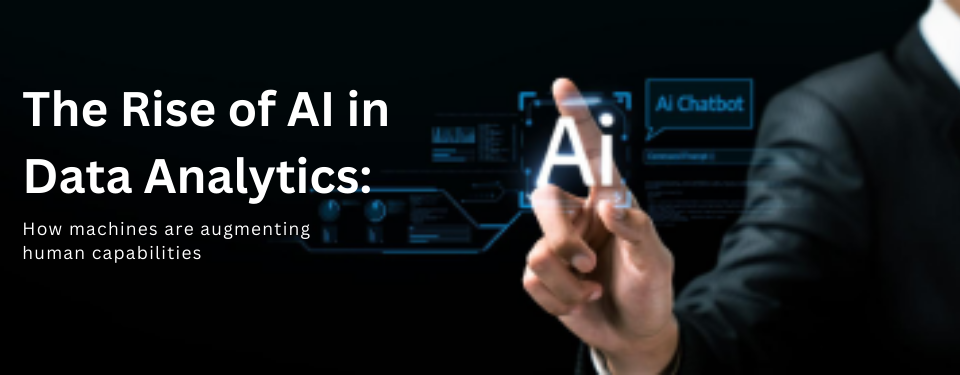
Posted On Aug 08 2024 | 14:41
As the world becomes increasingly data-driven, the integration of Artificial Intelligence (AI) in data analytics has become more invaluable than ever before. In the quest to harness the power of data, businesses are turning to machine learning algorithms to unlock insights, streamline processes, and enhance human potential.
AI,particularly machine learning, has the ability to process and analyze vast amounts of data in a fraction of the time it would take a human analyst. This enables organizations to uncover hidden patterns, identify trends, and make data-driven decisions with unprecedented accuracy and speed. By automating data analysis tasks, AI frees up human analysts to focus on more complex and strategic tasks, ultimately enhancing their potential and amplifying their impact.
Furthermore, AI can augment human intelligence by complementing human expertise with its computational power. Machine learning algorithms can learn from historical data and make predictions or recommendations based on patterns and trends. This collaboration between humans and machines creates a synergy that allows for more accurate and insightful analysis, leading to better decision-making and improved outcomes.
In addition, AI can enhance human potential by enabling organizations to scale their data analytics capabilities. With the ability to process and analyze massive amounts of data, machine learning algorithms can handle tasks that would be impossible or extremely time-consuming for humans alone. This scalability allows businesses to gain deeper insights and make more informed decisions, leading to increased efficiency, productivity, and innovation.
While the potential benefits of implementing AI in data analytics are immense, there are several challenges that organizations need to overcome. One of the main challenges is the availability and quality of data. AI algorithms require large amounts of high-quality data to learn effectively. However, many organizations struggle with data quality issues, such as incomplete or inconsistent data, which can hinder the performance of AI models.
Another challenge is the interpretability of AI models. Machine learning algorithms often work as black boxes, making it difficult for humans to understand how they arrive at their predictions or recommendations. This lack of interpretability can be a barrier to trust and acceptance, especially in critical domains such as healthcare or finance.
To address these challenges, organizations need to invest in data governance and data quality management processes. By ensuring data is accurate, complete, and consistent, organizations can improve the performance and reliability of their AI models. Additionally, efforts should be made to develop explainable AI techniques that provide insights into the decision-making process of AI models, increasing transparency and trust.
AI-powered data analytics is already transforming industries across the globe. In healthcare, machine learning algorithms are being used to analyze medical images, detect diseases, and predict patient outcomes. These algorithms can quickly and accurately analyze large volumes of medical images, assisting doctors in making more accurate diagnoses and treatment plans.
In finance, AI is revolutionizing fraud detection and risk management. Machine learning algorithms can analyze vast amounts of financial data to detect patterns and anomalies that may indicate fraudulent activities. By automating the detection process, AI can significantly reduce false positives and improve the efficiency of fraud prevention efforts.
In retail, AI is being used to personalize customer experiences and optimize supply chain operations. By analyzing customer data and behavior, machine learning algorithms can recommend personalized products or offers, increasing customer satisfaction and sales. Additionally, AI can optimize inventory management and demand forecasting, reducing costs and improving operational efficiency.
These real-world examples demonstrate the power of AI in data analytics and its potential to drive innovation, improve decision-making, and enhance human potential across various industries.
- Define clear objectives: Before implementing AI in data analytics, organizations should clearly define their objectives and identify the specific business problems they want to solve. This helps in selecting the appropriate machine learning algorithms and data sources.
- Invest in data infrastructure: AI algorithms require large amounts of data to learn effectively. Organizations should invest in robust data infrastructure to collect, store, and process data efficiently. This includes data warehouses, data lakes, and scalable computing resources.
- Ensure data quality: High-quality data is essential for accurate and reliable AI models. Organizations should implement data governance processes to ensure data is accurate, complete, and consistent. Data cleansing and preprocessing techniques should be applied to address data quality issues.
- Promote collaboration between data scientists and domain experts: Effective AI implementation requires collaboration between data scientists and domain experts. Domain experts provide valuable insights and context to guide the development and interpretation of AI models.
- Continuously monitor and update models: AI models should be continuously monitored and updated to ensure their performance and accuracy over time. This includes monitoring for biases, retraining models with new data, and adapting models to changing business requirements.
AI, particularly machine learning, is revolutionizing the field of data analytics. By harnessing the power of AI, organizations can unlock insights, streamline processes, and enhance human potential. From predictive analysis to advanced anomaly detection, the possibilities of AI in data analytics are endless.
However, the successful implementation of AI in data analytics requires careful consideration of challenges such as data quality and interpretability. By investing in data governance, explainable AI techniques, and best practices, organizations can overcome these challenges and fully leverage the potential of AI in data analytics.
As AI continues to advance, it is essential for organizations and individuals to continuously update their skills and knowledge. Connect with People Tech group to navigate the evolving landscape of AI in data analytics.
In conclusion, the integration of AI in data analytics is not just about automation or efficiency; it is about unleashing the full potential of human intelligence. With AI as a powerful ally, organizations can optimize operations, drive innovation, and make data-driven decisions that have a positive impact on their bottom line and society as a whole. The future of AI in data analytics is bright, and the possibilities for human potential are limitless.
